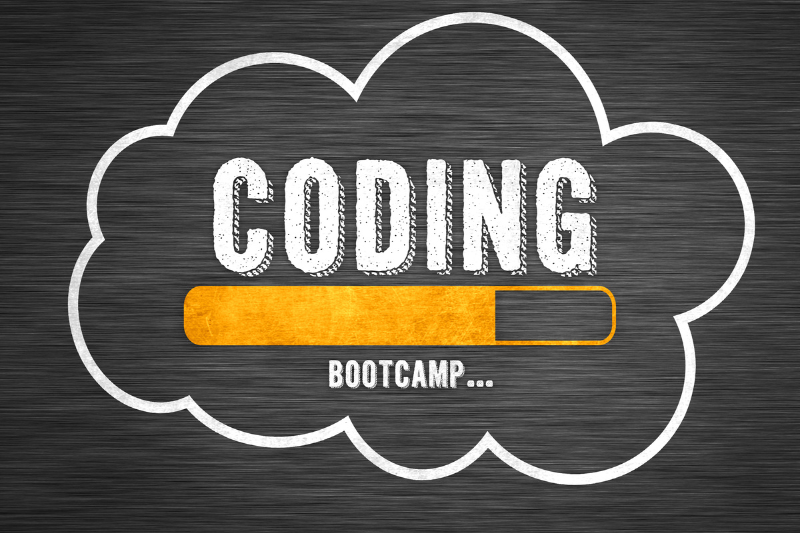The 21st century is heavily characterized by breakthroughs in the field of science. And to facilitate these advancements, the demand for skilled programmers is at an all-time high. Companies around the world are always on the lookout for software engineers, data analysts, web developers, and cybersecurity specialists amongst many others.
According to the Bureau of Labor Statistics (BLS), the demand for employees in information technology (IT) is projected to grow by 11% with the availability of 500,000 new jobs in the field. Computer science is therefore becoming increasingly popular in educational institutes around the world as people look toward a digital future.
But how does one acquire the necessary skills to land their dream programming job?
Well, there are two ways. One, you can acquire a proper degree in Computer Science. Two, you can enroll yourself in coding bootcamps. The latter is a shorter and cheaper alternative to a four-year college degree. According to reports issued by the Council on Integrity CIRR), 71.4% of the top 24 Bootcamp graduates were able to find jobs within 180 days between July and December of 2021.
In this blog post, we’re going to tell you everything there is to know about coding bootcamps including types, durations, costs, and much more.
Let’s get started.
What Is a Coding Bootcamp?

Coding bootcamps are educational programs that are specifically designed to provide students with programming skills and enable them to specialize in various fields such as data analytics, web development, and cybersecurity. They equip students with extensive knowledge of some of the most popularly used programming languages including JavaScript, Python, and Ruby.
Moreover, these boot camps are largely project-based and allow students to gain practical experience, preparing them for real-world experiences once they graduate and get hired. They also assist students in job placements.
Coding bootcamps are for people who want to learn programming without having to enroll in a four-year bachelor’s degree program and typically range from a few weeks to around two years. They are also popular among people who are looking to switch their career paths and move to the IT industry or for existing programmers who want to stay up-to-date with changing technologies and equip themselves with new skills.
Types of Coding Bootcamps

One of the biggest advantages of coding bootcamps is that they provide flexibility in their structure. In the process of searching for a coding bootcamp, you will find that bootcamps are of different types depending on the provider, program, format, and mode of instruction.
While the subjects taught are similar across models, the time commitment, expected outcomes, depth, and delivery of curricula vary by model.
Full-Time, In-Person Bootcamps
In full-time, in-person bootcamps, students attend class in a classroom for forty to eighty hours per week. These bootcamps typically last two to seven months on average. Because classes are held full-time, students can use the facilities after class to review concepts and work on projects.
Many students who enroll in intensive bootcamp work roughly eighty-hour per week. Therefore, the downside is that to attend in-person bootcamp, students must be willing to give up their full-time job and limit their extracurricular activities.
Because of COVID-19, almost all coding bootcamps have moved online, providing greater flexibility. However, some schools are returning to in-person and hybrid classrooms.
Self-Paced Online Bootcamps
Such boot camps require a smaller weekly time commitment, usually 10-20 hours, but take longer to complete. Students typically complete curriculum and projects on their own time and meet with a mentor several times per week. The majority of online schools also have an online community where students can interact with one another, further improving the learning experience. You can benefit from self-paced bootcamps from the comfort of your own home, and you don’t have to quit your job to do so.
Full-Time, Remote Bootcamps
Online Coding Bootcamps are full-time programs requiring 40 to 60 hours per week. To build communities, most online bootcamps will use Zoom Pro. Online bootcamps, like in-person bootcamps, teach UX design, data science, software development, and other skills. One-on-one instructor/mentor guidance, interaction with classmates, and targeted career coaching are the modes of instruction for such courses.
Part-Time, Career-Focused Bootcamps
A part-time bootcamper’s goal is usually to get a new job or a promotion at work, but some part-time students simply want to add new skills to their resume. Therefore, part-time bootcamps usually schedule classes on evenings and weekends.
Students enrolled in such bootcamps end up studying programming for a longer period, usually, 6 to 9 months, spending 6 to 15 hours per week in class and around 10 to 15 hours per week on extracurricular activities. Part-time bootcamp students typically work part-time or full-time jobs in addition to attending classes.
How Long is a Coding Bootcamp?
Coding bootcamps are generally shorter than college degrees but have different durations depending on whether they are full-time, part-time, or self-paced. Full-time bootcamps are often around four months long and require an intensive work schedule. Part-time coding bootcamps on the other hand, stretch over a longer period of time and can be completed in six months. If you opt for self-paced options you can choose to finish it whenever you like.
The duration of bootcamps also depends on how much content they are meant to teach you. They are usually long-term if they start from the very basics of programming and work their way up to more complex concepts and are short-term when they expect you to be familiar with the basics and only focus on teaching you a specific skill.
Can You Land an Actual Job With a Coding Bootcamp?

Do companies actually hire bootcamp graduates? The answer is Yes!
While the traditional belief is that completing four-year degree programs is the only way that you can get employed, a lot of companies do in fact consider the job applications of bootcamp graduates and hire them in certain positions. Even multi-billion dollar corporations such as Google, Amazon, and Microsoft have employees with programming skills from coding bootcamps.
All you need to do to land your dream job is be smart. Instead of using the old shotgun approach and blasting your resume to every company you see, a strategic route may prove way better.
Here are nine tips to help you get a job in programming if you have no prior work experience:
1. Make a portfolio.
2. Develop your online presence.
3. Make connections with other programmers.
4. Acquire certifications.
5. Participate in coding competitions or challenges.
6. Create an effective resume.
7. Construct projects to hone your hands-on skills.
8. Participate in open-source projects.
Moreover, interviews can be challenging because of the competitive nature of certain positions so make sure that you practice your skills and prepare for your interviews.
At the end of the day, the most important thing you can do to land a job is to be confident in your skill as a coding bootcamp graduate and sell yourself well.
Most In-demand Coding Bootcamps for 2022

With the development of technology and the shift to a highly digitized world, there is a growth in demand for programmers, and several positions continue to open up in specialized fields, the most popular of which are computer science, data science, engineering, and cybersecurity.
Here are 3 of the most in-demand bootcamps in 2022:
1. Fullstack Academy
Fullstack Academy is a New York City-based immersive software engineering coding bootcamp. Over the course of a 13-week on-campus program, students in the full-time flagship course learn full-stack JavaScript.
In terms of course features, Fullstack’s bootcamp aims for you to leave with four projects in your portfolio by the end, based on a project-based structure. They provide a variety of coding courses, with a focus on pair programming, which is a useful concept for web developers.
2. Wild Code School
Wild Code School provides 5-month training courses in web development and data analysis. In 5 months, the courses will teach you HTML, CSS, JavaScript, React, and Node.js. They offer a part-time Frontend Development program, as well as a free introductory course and employability coaching. Wild Code School is open to all, and no prior coding experience is required to apply.
3. CareerFoundry
CareerFoundry is an online bootcamp that provides career changers with flexibly paced programs in web development, UX design, UI design, and data analytics. You’ll learn with a hands-on, project-based curriculum, culminating in a fully-fledged professional portfolio, with the assistance of dedicated tutors and mentors. They also offer a job guarantee, with 96% of eligible graduates finding work in technology within 6 months of graduation.
The Cost of a Coding Bootcamp in 2022

Coding bootcamps are cheaper and quicker alternatives to four-year bachelor’s degree programs which cost an average of $16,300 per year in 2018-19 according to statistics provided by the National Center for Education Statistics. This adds up to a whopping $65,000 for all four years.
In comparison, bootcamps generally cost between $10,000 and $15,000 according to reports issued in 2020, and even though they are still costly, you end up spending a lot less than you would in college programs. However, you must bear in mind that even in coding bootcamps there are additional expenses that you have to take into account, such as learning materials, hardware equipment, and living expenses which end up adding to your total.
Coding bootcamp fees vary depending on whether they are part-time, full-time, online, or in-person. After reviewing over 620 bootcamp programs, According to stats, the average cost of bootcamps in 2020 was almost $13,600, with part-time programs slightly cheaper at just a little over $12,000 and full-time programs at around $14,600.
How Much Can You Earn After a Coding Bootcamp?

Now that you know that there are several opportunities for coding bootcamp graduates to land a job, let’s talk about how much the tech industry can pay you for your qualification.
The salaries of coding bootcamp graduates generally range from $60,000 to $125,000 annually across the United States. If you have a college degree and also attended bootcamp to further hone your programming skills, you are likely to get paid higher and can earn an average starting salary of $85,000. If you apply for a job without a college degree and just with your bootcamp qualifications, your first employer may pay you around an average of $75,000.
Some of the highest paying positions that you can apply for as a graduate of coding bootcamp in the tech industry are as a data scientist, software engineer, application developer, and product manager.
How to Choose the Best Coding Bootcamp – The Right Coding Bootcamp for You

Coding bootcamps are of different types depending on their providers, modes of instruction, durations, program types, and the specializations that they offer. If you are planning on attending these bootcamps, make sure you do your research and find one that suits you best especially because most bootcamps do not have accreditation and while that can be beneficial in some cases, it also has considerable drawbacks.
Here are a few tips to help you choose the best bootcamp for yourself:
- Examine student feedback.
- Speak with teachers and former students.
- Investigate introductory and preparatory courses.
- Clarify any time constraints or requirements.
- Examine third-party verified student outcomes reports carefully.
- Compare and contrast programs with high rankings.
- Visit the campus if your bootcamp will be held on-site.
- Consider the teaching style of the program.
FAQs
Most coding bootcamps operate independently and are not accredited. One of the most important reasons for this is that they need to be able to adapt to technological advancements and modify their curricula according to the needs of the time.
However, this non-accreditation can be a drawback because it does not guarantee that the bootcamps will live up to their promises and maintain teaching standards. Therefore, if you plan on joining an independent non-accredited bootcamp, make sure it is a member of the CIRR so that you may have some level of quality assurance.
Different coding bootcamps have different curricula. Some focus on providing already existing programmers with specialized skills in a certain field, but some are designed to help beginners learn programming from the very basics. These bootcamps are mostly long-term and full-time and slowly build their way up to teaching more complex concepts.
Graduating from coding bootcamps without a degree has the potential of landing you a job, sometimes even in big companies. However, you must keep in mind that while you may qualify for certain positions, most organizations still require you to have a degree and also pay you higher if you have one.
Yes, graduates from coding bootcamps have the opportunity of landing jobs in not only Google but also the other members of the Big Five, namely Amazon, Apple, Microsoft, and Facebook. In fact, according to a survey of 370 bootcamps in 2021, an average of around 6% of these bootcamp graduates get employed in the Big Five.
Conclusion
This article provides you with detailed information on coding bootcamps (ultimate guide) so that you can learn their value and choose the best coding bootcamp for yourself, especially when the world is making such a fast-paced shift towards digitization.
You may choose to attend coding bootcamps online or in person and can choose between full-time, part-time, and self-paced options. Coding bootcamps provide a variety of specializations, the highest in demand being computer science, data analytics, and cyber security. Specialization in these fields opens up opportunities in the fields of web development, data science, and UI/UX.
Many graduates ask themselves “Are coding bootcamps worth it?”. Well, the answer is yes. They are not only cheaper options but also have high employment rates both in small and multi-billion dollar companies like the Big Five. All you need to do to land a well-paying job is to first research which bootcamp suits you best, hone your skills while you study there, and then take a smart approach towards applying for jobs.



